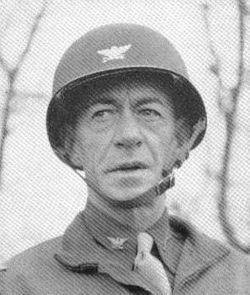Distinguished Service Cross citation:
The President of the United States of America, authorized by Act of Congress July 9, 1918, takes pleasure in presenting the Distinguished Service Cross to Colonel (Cavalry) Harry Albert Flint (ASN: 0-3377), United States Army, for extraordinary heroism in connection with military operations against an armed enemy while serving as Commanding Officer, 39th Infantry Regiment, 9th Infantry Division, in action against enemy forces in August 1943 near Troina, Sicily. Going forward with the attacking battalions, Colonel Flint spent his entire days moving about the squad and platoon installations to cheer and encourage all ranks. During the attack on 4 August 1943 he personally led the advance through enemy fire, waving to his men to follow him forward. He was often covered and obscured from view by dust and smoke from bursting shells, later to be revealed as standing upright and urging the men forward. Colonel Flint's outstanding leadership, personal bravery and zealous devotion to duty exemplify the highest traditions of the military forces of the United States and reflect great credit upon himself, his unit, and the United States Army.
Division: 9th Infantry Division
General Orders: Headquarters, Seventh U.S. Army, General Orders No. 25 (1943)
Distinguished Service Cross Citation:
The President of the United States of America, authorized by Act of Congress July 9, 1918, takes pride in presenting a Bronze Oak Leaf Cluster in lieu of a Second Award of the Distinguished Service Cross (Posthumously) to Colonel (Cavalry) Harry Albert Flint (ASN: 0-3377), United States Army, for extraordinary heroism in connection with military operations against an armed enemy while serving as Commanding Officer, 39th Infantry Regiment, 9th Infantry Division, in action against enemy forces during the invasion of Normandy, France, on 23 July 1944. While advancing on the Saint-Lô-Périers road, Colonel Flint's regiment was held up by heavy mortar fire. Leading from the front, Colonel Fling and a rifle patrol soon found the source of enemy fire. He reported by radio over the walkie-talkie: "Have spotted pillbox. Will start them cooking." Calling for a tank, he rode atop it in a rain of fire as it sprayed the hedgerows. During the attack, the tank driver was wounded, stopping it, whereupon Colonel Flint crawled down, and went forward on foot with his men. As he led the patrol into the shelter of a farmhouse he was hit by a sniper's bullet. He died of his wounds the following day. Colonel Flint's outstanding leadership, personal bravery and zealous devotion to duty at the cost of his life, exemplify the highest traditions of the military forces of the United States and reflect great credit upon himself, the 9th Infantry Division, and the United States Army.
Division: 9th Infantry Division
General Orders: Headquarters, First U.S. Army, General Orders No. 75 (1944)
Distinguished Service Cross citation:
The President of the United States of America, authorized by Act of Congress July 9, 1918, takes pleasure in presenting the Distinguished Service Cross to Colonel (Cavalry) Harry Albert Flint (ASN: 0-3377), United States Army, for extraordinary heroism in connection with military operations against an armed enemy while serving as Commanding Officer, 39th Infantry Regiment, 9th Infantry Division, in action against enemy forces in August 1943 near Troina, Sicily. Going forward with the attacking battalions, Colonel Flint spent his entire days moving about the squad and platoon installations to cheer and encourage all ranks. During the attack on 4 August 1943 he personally led the advance through enemy fire, waving to his men to follow him forward. He was often covered and obscured from view by dust and smoke from bursting shells, later to be revealed as standing upright and urging the men forward. Colonel Flint's outstanding leadership, personal bravery and zealous devotion to duty exemplify the highest traditions of the military forces of the United States and reflect great credit upon himself, his unit, and the United States Army.
Division: 9th Infantry Division
General Orders: Headquarters, Seventh U.S. Army, General Orders No. 25 (1943)
Distinguished Service Cross Citation:
The President of the United States of America, authorized by Act of Congress July 9, 1918, takes pride in presenting a Bronze Oak Leaf Cluster in lieu of a Second Award of the Distinguished Service Cross (Posthumously) to Colonel (Cavalry) Harry Albert Flint (ASN: 0-3377), United States Army, for extraordinary heroism in connection with military operations against an armed enemy while serving as Commanding Officer, 39th Infantry Regiment, 9th Infantry Division, in action against enemy forces during the invasion of Normandy, France, on 23 July 1944. While advancing on the Saint-Lô-Périers road, Colonel Flint's regiment was held up by heavy mortar fire. Leading from the front, Colonel Fling and a rifle patrol soon found the source of enemy fire. He reported by radio over the walkie-talkie: "Have spotted pillbox. Will start them cooking." Calling for a tank, he rode atop it in a rain of fire as it sprayed the hedgerows. During the attack, the tank driver was wounded, stopping it, whereupon Colonel Flint crawled down, and went forward on foot with his men. As he led the patrol into the shelter of a farmhouse he was hit by a sniper's bullet. He died of his wounds the following day. Colonel Flint's outstanding leadership, personal bravery and zealous devotion to duty at the cost of his life, exemplify the highest traditions of the military forces of the United States and reflect great credit upon himself, the 9th Infantry Division, and the United States Army.
Division: 9th Infantry Division
General Orders: Headquarters, First U.S. Army, General Orders No. 75 (1944)
Inscription
COLONEL US ARMY











